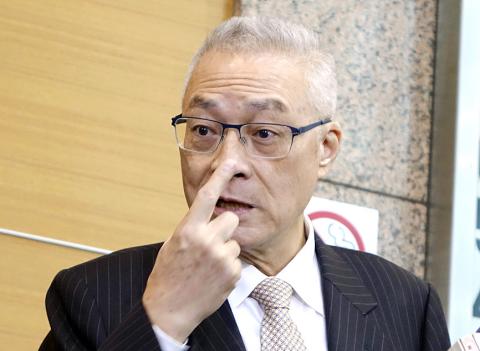Chinese Nationalist Party (KMT) Chairman Wu Den-yih (吳敦義) yesterday rejected allegations that he was involved in negotiations with then-Executive Yuan secretary-general Chien Tai-lang (簡太郎) over a navy minesweeper project during his tenure as vice president and accused President Tsai Ing-wen (蔡英文) of having a close connection with a scandal-hit shipbuilder.
Local media reported that Chien, who led Cabinet negotiations for a syndicated loan to Ching Fu Shipbuilding Co (慶富造船) in 2015, met with Wu twice at the Presidential Office Building.
Wu said that while there were ample opportunities to meet with Chien, who was unlikely to speak with him about the minesweeper project, because the vice president has no clearly defined state function.

Photo: Wang Yi-sung, Taipei Times
Wu displayed a picture of Tsai talking with Ching Fu president and founder Chen Ching-nan (陳慶男) at Coast Guard Administration drills in Keelung earlier this year, saying: “This picture says everything.”
There are only two possible explanations for any person being allowed past the security perimeter of the head of state overseeing a security exercise: either Tsai agreed to meet with Chen, or “security forces let him through because he was familiar to them,” Wu said.
It is impossible for anyone to pass the security guarding the head of state if the president does not wish to meet them, or if the security personnel are not familiar with them, Wu said.
Asked about the Democratic Progressive Party’s (DPP) remarks that Wu seems eager to distance himself from the case, Wu said: “I have no need to detach myself from allegations that never stuck.”
He also denied that he was connected to the Ching Fu case through former Bank of Taiwan president Shiau Chang-ruey (蕭長瑞), who served as the director of Wu’s office after the Tsai administration took power.
Retired presidents and vice presidents are granted courtesy funds after they have concluded their terms and most of them establish offices with that money.
Wu said Shiau did not talk to him about the loans and soon left his office to work at the Bank of Taiwan.
“It is without doubt that I did not exceeded my bounds during my tenure as vice president,” Wu said.
DPP spokesperson Ho Meng-hua (何孟樺) said that Wu’s denial and deflection betrays his concern about the incident and that he cannot give a straight answer about his involvement with Ching Fu.
Chen was the only person from the private sector to attend four state banquets that the administration of former president Ma Ying-jeou (馬英九) held for foreign dignitaries, Ho said, adding that Chen and his wife shared a table with Wu at one of the banquets.
Chen visited the Presidential Office Building twice when Chien was Cabinet secretary-general, Ho said, adding that the visits coincided with Chien’s meetings with banks on the syndicated loan and its amount.
Based on Wu’s logic, it could be questioned whether Wu had deep ties with Chen and his family, Ho said.

Chinese Nationalist Party (KMT) Chairman Eric Chu (朱立倫), spokeswoman Yang Chih-yu (楊智伃) and Legislator Hsieh Lung-chieh (謝龍介) would be summoned by police for questioning for leading an illegal assembly on Thursday evening last week, Minister of the Interior Liu Shyh-fang (劉世芳) said today. The three KMT officials led an assembly outside the Taipei City Prosecutors’ Office, a restricted area where public assembly is not allowed, protesting the questioning of several KMT staff and searches of KMT headquarters and offices in a recall petition forgery case. Chu, Yang and Hsieh are all suspected of contravening the Assembly and Parade Act (集會遊行法) by holding

PRAISE: Japanese visitor Takashi Kubota said the Taiwanese temple architecture images showcased in the AI Art Gallery were the most impressive displays he saw Taiwan does not have an official pavilion at the World Expo in Osaka, Japan, because of its diplomatic predicament, but the government-backed Tech World pavilion is drawing interest with its unique recreations of works by Taiwanese artists. The pavilion features an artificial intelligence (AI)-based art gallery showcasing works of famous Taiwanese artists from the Japanese colonial period using innovative technologies. Among its main simulated displays are Eastern gouache paintings by Chen Chin (陳進), Lin Yu-shan (林玉山) and Kuo Hsueh-hu (郭雪湖), who were the three young Taiwanese painters selected for the East Asian Painting exhibition in 1927. Gouache is a water-based

Taiwan would welcome the return of Honduras as a diplomatic ally if its next president decides to make such a move, Minister of Foreign Affairs Lin Chia-lung (林佳龍) said yesterday. “Of course, we would welcome Honduras if they want to restore diplomatic ties with Taiwan after their elections,” Lin said at a meeting of the legislature’s Foreign Affairs and National Defense Committee, when asked to comment on statements made by two of the three Honduran presidential candidates during the presidential campaign in the Central American country. Taiwan is paying close attention to the region as a whole in the wake of a

OFF-TARGET: More than 30,000 participants were expected to take part in the Games next month, but only 6,550 foreign and 19,400 Taiwanese athletes have registered Taipei city councilors yesterday blasted the organizers of next month’s World Masters Games over sudden timetable and venue changes, which they said have caused thousands of participants to back out of the international sporting event, among other organizational issues. They also cited visa delays and political interference by China as reasons many foreign athletes are requesting refunds for the event, to be held from May 17 to 30. Jointly organized by the Taipei and New Taipei City governments, the games have been rocked by numerous controversies since preparations began in 2020. Taipei City Councilor Lin Yen-feng (林延鳳) said yesterday that new measures by